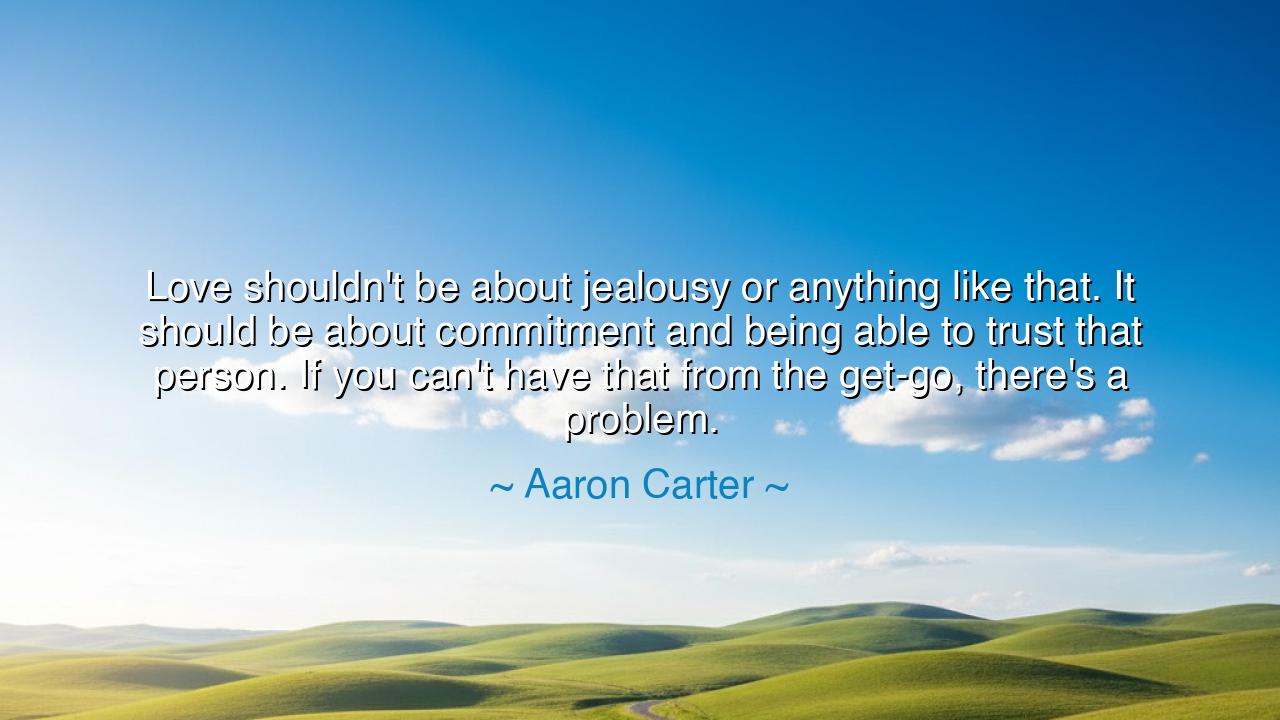
Love shouldn't be about jealousy or anything like that. It should
Love shouldn't be about jealousy or anything like that. It should be about commitment and being able to trust that person. If you can't have that from the get-go, there's a problem.






There are truths about the heart that are as ancient as humanity itself, and among them are the candid words of Aaron Carter, who observed: “Love shouldn't be about jealousy or anything like that. It should be about commitment and being able to trust that person. If you can't have that from the get-go, there's a problem.” In this simple statement lies a profound reflection on the essence of love—an emotion too often corrupted by suspicion, possessiveness, and insecurity. Carter reminds us that love’s highest form is not tethered to fear, but rooted in trust, loyalty, and mutual commitment, the pillars that sustain the heart through trials, distance, and the passage of time.
To understand the depth of Carter’s insight, one must first grasp the destructive nature of jealousy in love. Jealousy is the shadow of insecurity, creeping into hearts and whispering that affection is scarce and loyalty fragile. It measures devotion by possession, and often, it poisons the very bond it seeks to protect. True love, Carter teaches, is not an arena for suspicion or control—it is a sanctuary where trust is offered freely and received gratefully. Without that trust from the beginning, the relationship is a fragile vessel, destined to leak or shatter at the first storm.
The origin of Carter’s wisdom lies not only in his own life but in the universal experience of human relationships. Even in youth, we encounter love in its various forms—romantic, familial, and platonic. Each requires faith in another’s intentions, patience with their faults, and the courage to rely on them without constant fear of betrayal. Carter’s words echo the timeless understanding that love is not merely desire or infatuation; it is a commitment to nurture, respect, and uphold the dignity of another. Without these foundations, love becomes fragile, vulnerable to every whisper of doubt.
History offers vivid illustrations of this truth. Consider Abelard and Heloise, the famed lovers of medieval France. Their passion was profound, yet the world around them was filled with jealousy, interference, and mistrust. Even in the height of their devotion, external pressures and the fragility of trust caused profound suffering. Those who love without cultivating mutual confidence often find themselves ensnared by fear and turmoil, proving that jealousy and distrust are antithetical to the enduring bonds of the heart. Carter’s observation mirrors this timeless lesson: love without trust is love under siege.
Even in modern times, relationships falter when suspicion replaces faith. Partners consumed by jealousy often mistake attachment for proof of devotion, believing that constant surveillance or questioning will preserve love. Yet this approach suffocates rather than strengthens the bond. By contrast, couples who cultivate trust and commitment find resilience even in the face of hardship. They do not cling in fear, but stand together in assurance, allowing love to flourish unburdened by needless suspicion. Carter’s words remind us that the absence of trust from the outset signals a deeper problem—one that no amount of passion can repair.
Carter’s insight also carries a moral dimension: love is an act of courage. To love another without mistrust is to risk vulnerability, yet it is this very vulnerability that makes the bond sacred and enduring. When we extend trust to a partner, we acknowledge their autonomy, their honesty, and their capacity to honor the heart placed in their care. Relationships built on fear and jealousy, however, collapse under the weight of their own doubt. The wise learn to recognize the difference and to act accordingly: to invest in bonds that honor mutual respect and to release those tainted by distrust.
The lesson is clear: cultivate love with trust, commitment, and integrity. Observe the patterns of your heart and the behavior of your partner. If suspicion dominates from the beginning, if jealousy eclipses joy, do not ignore the warning. Foster relationships that celebrate freedom, respect, and mutual support. Allow love to be a garden, not a prison; a bond that uplifts, not a chain that constricts. By nurturing trust, you ensure that love grows stronger, deeper, and more resilient over time.
And so, let Aaron Carter’s words resonate through every age: “Love shouldn't be about jealousy or anything like that. It should be about commitment and being able to trust that person. If you can't have that from the get-go, there's a problem.” Let the heart learn courage, the soul learn patience, and the mind discern where trust flourishes. Love rightly, and it will endure; love with jealousy, and it will falter. For the bonds that survive are not those that cling in fear, but those that soar in the freedom of mutual faith.






AAdministratorAdministrator
Welcome, honored guests. Please leave a comment, we will respond soon